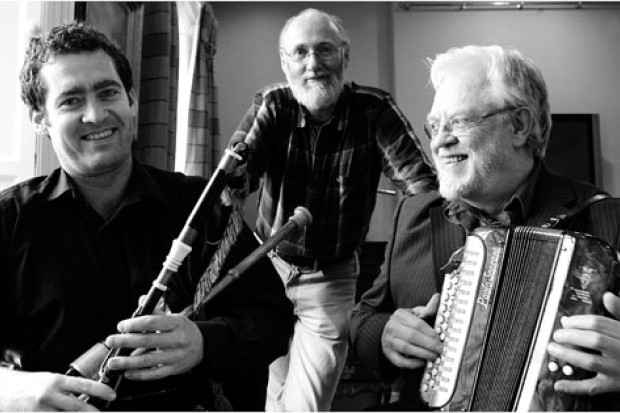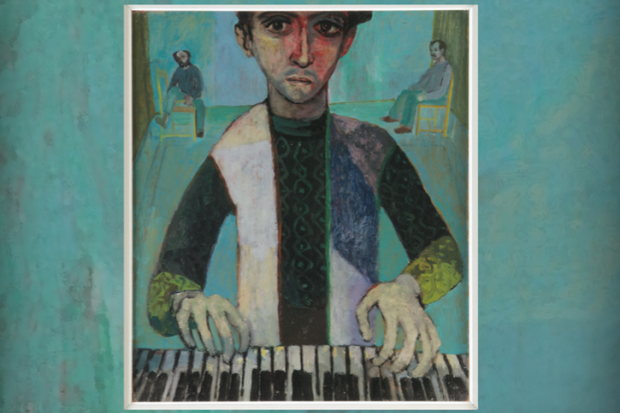
Damien O’Reilly
Fired in the Crucible of Dance
The latest recording from the Raelach Records stable focuses on the music of Damien O’Reilly, a button accordion and melodeon player from Corofin, Co. Clare, an area with a musical tradition as solid and as permanent as the rocky landscape adjoining it. As with many of the other albums produced by Raelach over the past few years, it serves to establish the profile of a relatively emergent musician (or at least one who hasn’t made a solo album to date). O’Reilly is well known as a musician for set dancers in the local area, and has appeared at festivals across Ireland, but this is his first major recording. Also similar to other releases on the label, it is unfussy in its approach, something that applies equally to the repertoire, style of performance, and its presentation and arrangement.
In many ways O’Reilly’s playing continues on the lineage of B/C accordion playing that stemmed from the likes of Paddy O’Brien and Joe Burke, in that its style is built upon the exploitation of a full range of rolls, grace notes and triplets. It is more expansive though than the sometimes unfairly maligned ‘competition style’ favoured in the Fleadh Cheoil, and the ornamentation is fully integrated into a strong rhythmic style of playing, as opposed to being followed by rote. ‘Jim Donoghue’s Reel’ perhaps shows off his energetic playing at its best: here the emblematic B/C ornamentation of rolls and triplets surges out of the reels and becomes a springboard for more melodic diversions from the tunes. O’Reilly also has a quite distinctive approach to the basses of the instrument, and often includes drones and more punctuative chording, as opposed to the more regular vamping preferred by many other B/C accordion players.
Backing and set dancing
On Dúchas O’Reilly has chosen not to include any duet tracks with guest musicians, instead concentrating on the art of the solo musician, albeit in its accompanied form: his brother Padraic (piano), John Blake (guitar), and Caoimhín Ó Fearghail (bouzouki) provide support throughout. If anything there is a touch too much backing on the album, it being omnipresent aside from the slow air ‘An Ciarraíoch Mallaithe’ and a couple of opening tunes of sets. This was particularly notable on repeat listens to the album, as for me some of the most effective and standout playing happens during these unaccompanied moments – for instance on the jig ‘The Maiden that Jigs it in Style’, and on ‘Maidhc Dainnín Ó Sé’s Slide’. The second of these sets shows off how O’Reilly’s style has been fired in the crucible of playing for set dancing in Clare, with its audible foot-tapping and an effervescent rhythmic drive that sparks throughout. The first slide also really exploits the bass set-up of this accordion, allowing the player to combine a bass drone with chord changes over it. This feature of O’Reilly’s playing crops up on some other tracks (for instance on ‘Jim Donoghue’s’), but at times the backing instruments clash with these drones so that their effect is muted.
In general the material on the album will be familiar to many listeners, with rock solid standards like ‘Farrell O’Gara’, ‘Páidín Ó Raifeartaigh’, and ‘The Boys of Ballisodare’, but there are some other gems which have been unearthed, not least of which is the substantive double jig ‘Triall Mhic Shiacais ar Luimneach’. There is also a good scattering of tunes outside the usual jig and reel staples, including a channelling of the great Tony MacMahon on a pair of marches.
Mature style
While it is the sound of the Manfrini B/C accordion (a more recent button accordion brand) which predominates, the recording isn’t limited to just the one instrument, and O’Reilly shows off his prowess on the melodeon on some barndances and jigs, again underlining his ability to rise the music for potential dancers. One odd feature of the recording was the amount of reverb added to the sound, which I felt detracted from the clarity of the music at times, especially when listening through headphones (which is an unfortunate necessity at times).
Devotees of the B/C button accordion will be well-served by this album, which succeeds in portraying a profile of a musician with a developed and mature style, and which (from the excellent sleeve notes) was informed not just by the music of Clare but also reflects on the wealth of traditional music available on recordings. This album will, no doubt over time, itself contribute to this same process of recorded and digital transmission, and make its own impact on the next generation of accordion players.
Dúchas by Damien O’Reilly is available to purchase from www.raelachrecords.com.
Listen to a selection of tracks on Bandcamp by clicking on the image below.
Published on 31 July 2019
Adrian Scahill is a lecturer in traditional music at Maynooth University.

















